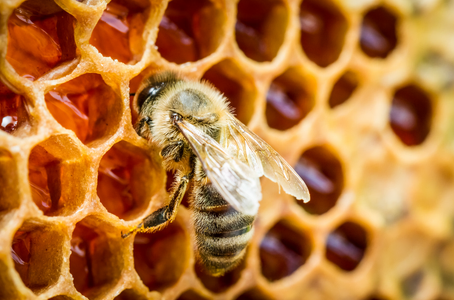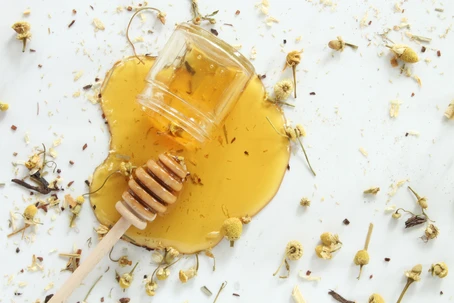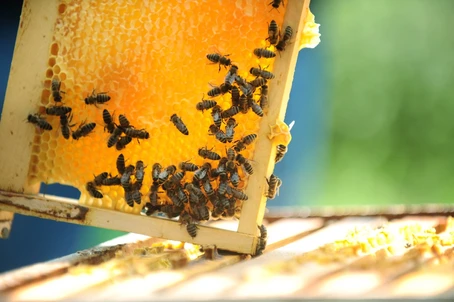
What is the crystallization of honey?
Remember how sometimes when you leave honey

Remember how sometimes when you leave honey in the fridge for a long time, it tends to form crystals? This process is known as honey crystallization or simply granulation. It’s a natural process but is often seen as a bad thing. Sometimes, it even signifies that the product is unadulterated. So next time please do not throw your jar away!

The major constituents of honey are sugar and water. The sugar content is higher than that of water. Sometimes, it can happen that the water content might not be enough water content to keep the sugar dissolved. Eventually, with time, the two will eventually separate. So when the water is crystallized, the honey is also crystallized. Slight differences in chemical composition can also take place.
The main cause solely lies in the chemical composition of the honey. Not even 1% of change is caused by moisture content. There are several factors that can cause honey to crystallize. Some of the key factors that can impact the crystallization process of honey are:
Crystallized honey is perfectly fine for consumption. No changes occur in the nutritional value of crystallized honey. You can just decrystalize it and consume it again. It is just the water in the natural sugar that has been solidified and can be liquefied by just applying a little heat. No changes in the chemical composition will take place and is totally safe to consume.
How to prevent honey from crystallizing?
There are several ways by which you can avoid the crystallization of honey.
Some of them are:
1. Heating the honey.
2. Storing it at low temperatures.
3. Ultrasound treatment.
4. Filtration and ultrafiltration.
There are even several ways by which you can delay the onset of the crystallization process. Some of them are:
1. You can heat and then filter the honey to store it for a longer time period. This process is also known as pasteurization.
2. Some beneficial compounds of honey can be removed.
Here are some of the best ways by which you can prevent honey from crystallizing at home are:
1. Store it in airtight containers and away from direct sunlight.
2. Keep it at optimum room temperature. Refrigerating it can accelerate crystallization.
Yes, crystallized honey can be fixed! All you gotta do is just warm it up a little bit to allow the crystals to melt. Do not heat it in high temperatures as the good stuff might end up getting killed. The antibacterial properties must be retained.
Different honey takes different times. It even depends on the manner in which it was processed, for how long it was stored, etc. The lesser the moisture content, the faster the rate of crystallization. Lower temperatures can also accelerate the rate of crystallization.
Yes, absolutely pure honey also crystallizes. Sometimes, when the temperature falls down, the honey can crystallize in the hive itself. It has been noticed that pollen grains and beeswax particles can play a major role in influencing the granulation process. So, we can even say that crystallization is a sign of the purity of honey.
No, honey doesn’t go bad when it crystallizes. You can decrystallize honey. But if the crystallized honey starts to ferment, the flavor will change, and you won’t be able to restore the honey.
Yes, it’s safe to eat crystallized honey. You can recrystallize it if you’d prefer it to be liquid again.
Yes. Crystallization is a natural process that pure, raw honey goes through. Not every honey will crystallize, and some will crystallize faster than others. But it’s a good sign that your honey is real and less processed. Honey can even crystallize in the hive if temperatures get too low!
Manuka honey is different from any other brand’s honey. We provide you with the purest form of honey, whose natural composition has not been altered at all. Well, in order to give you the best, we cream our honey. In this process, we mix fine honey “seed crystals” with liquid honey. Later, this honey is stored at a low temperature to prevent crystallization. The seed crystals are added to provide a base for the natural crystals to grow well. It minimizes their size and protects the integrity of the honey’s natural flavor. As already said, pure honey usually tends to crystallize, and manuka honey also being in its unadulterated raw form may still crystallize

Remember how sometimes when you leave honey

Mānuka Honey, derived from the nectar of

UMFHA is moving over to a new

Mānuka honey, with its exceptional healing properties,
Lorem ipsum dolor sit amet consectetur adipiscing elit dolor
Lorem ipsum dolor sit amet consectetur adipiscing elit dolor
WhatsApp us